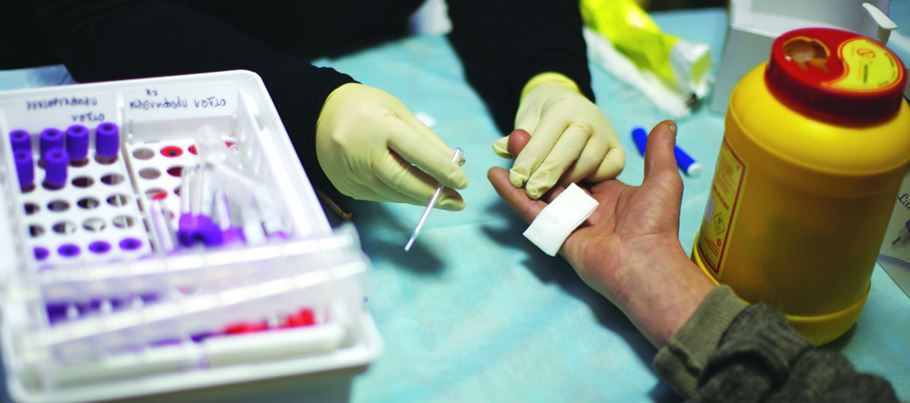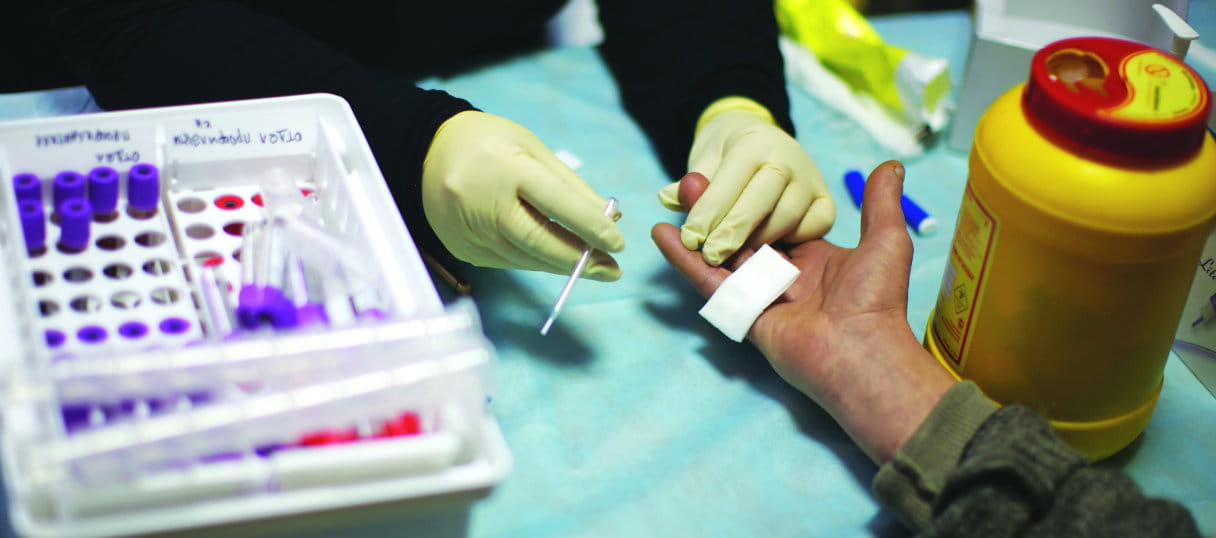Injecting drug users (IDUs) are one of the groups most at risk of HIV infection. The Freedom Programme is an organisation working to prevent the spread of HIV among IDUs in Egypt.

Articles
Reducing the risks for injecting drug users
Injecting drug users (IDUs) are one of the groups most at risk of HIV infection. The Freedom Programme is an organisation working to prevent the spread of HIV among IDUs in Egypt.
2015 Available in English, French, Portuguese and Spanish

From: HIV – Footsteps 98
How to break down stigma, prevent mother-to-child transmission and support people living with HIV


A health worker carries out an HIV test at a drug rehabilitation centre. Photo: Kieran Dodds/Tearfund
Although a relatively low proportion of Egypt’s population is HIV-positive, the percentage of IDUs who are living with HIV is much higher. If IDUs use non-sterile needles and syringes that have previously been used by someone who is HIV-positive, they are at very high risk of HIV infection.
The Freedom Programme
The Freedom Programme was started in 1989 and is now one of the largest drug rehabilitation programmes in the Arab world. They run 28 drug rehabilitation centres across Egypt, as well as an outreach and drop-in centre. They also offer training for people working with those suffering from addictions, and these courses include information on HIV prevention.
A holistic approach
The Freedom Programme runs a range of holistic activities to help prevent HIV among people who inject drugs:
- Outreach teams, made up of a social worker and two ex-IDUs, build relationships with IDUs in the community. They provide IDUs with education about dangerous behaviours and how to protect themselves better.
- The outreach workers refer any IDUs who want to stop using drugs to rehabilitation centres, where they can go through a 12-step rehabilitation programme.
- Freedom’s workers provide IDUs with condoms and training on how to use them, helping them to adopt safer sexual practices.
- The Freedom Programme provides IDUs with sterile needles and syringes. This is to prevent them from contracting HIV by using injecting equipment that has been used by other people. It is part of an approach called ‘harm reduction’ (see below).
- Counselling is provided for IDUs before and after they take an HIV test to help them deal with the result.
- Advocacy workshops are held for IDUs, teaching them about their rights and training them in advocacy skills.
- The Freedom Programme advocates at a national level for better prevention of substance abuse and HIV, campaigning for the better treatment of marginalised groups.
What works well?
The Freedom Programme has found that several approaches are particularly effective in its work with IDUs.
- Having ex-IDUs on the outreach teams provides current IDUs with powerful role models, bringing an inspiring message of hope and transformation. The ex-IDUs are given full training, and supporting others helps to increase their own sense of self-worth.
- It is vital to build caring and respectful relationships with IDUs, who have often been stigmatised by society. Outreach workers offer a year of follow-up support for the people they are helping. Freedom staff aim to make their rehabilitation centres feel like home.
- Support groups for people living with HIV are very successful, and Freedom refers HIV-positive IDUs to these.
- The Freedom Programme’s good reputation means that its leaders are often asked to speak about drug abuse and HIV in the media, particularly on television. This helps to spread Freedom’s advocacy messages.
- The Freedom Programme has also arranged meetings between key decision-makers, religious leaders and people living with HIV to advocate for their rights.
The ethics of harm reduction
Some people might feel uncomfortable at the thought of providing IDUs with sterile needles and syringes. People might wonder: Are we enabling people’s unhealthy behaviour? Is it ethical to provide this kind of help? Might it actually increase drug abuse?
However, many years of research have shown that providing sterile needles and syringes effectively reduces the spread of HIV among IDUs. A World Health Organization (WHO) report has found that these programmes do not increase injecting drug use.
It may take people many months or years to break free from drug addiction and other harmful behaviour. In the meantime, we can protect people from the dangers that they may find themselves in.
View or download this resource
Get this resource
Get this resource
Similarly Tagged Content
Share this resource
If you found this resource useful, please share it with others so they can benefit too.

Subscribe to Footsteps magazine
A free digital and print magazine for community development workers. Covering a diverse range of topics, it is published three times a year.
Sign up now - Subscribe to Footsteps magazine


